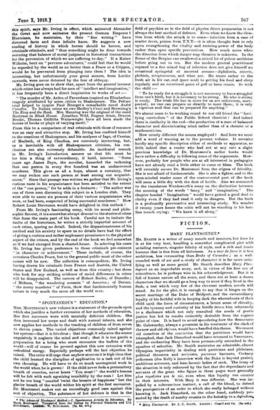FICTION.
MARY PLANTAGENET.*
Mn. Sfedrrn is a writer of many moods and manners, but here he is at his very best, handling a somewhat complicated plot with unfailing resource, -singular felicity of style, and a rich and ironic humour that is free from all bitterness. As a tour de force it is less ambitious, less coruscating than Broke of Covenden ; as a well- rounded work of art and a study of character it is far more satis- fying as well as more genial. Mr. Snaith describes Mary Plan- tagenet as an improbable story, and, in virtue of his free use of coincidence, he is perhaps wise in his acknowledgment. But it is full of human nature all the same, and there are at least a dozen characters that we should go a long way to meet if they lived in the flesh, a test which very few of the cleverest modern novels will stand. As for the plot, it is enough to say that it hinges on the secret marriage of the Duke of Bridport, and the extraordinary loyalty of his faithful wife in keeping dark the whereabouts of their child until the force of circumstances, a latent sense of chivalry, and the tyranny and curiosity of his family drove him reluctantly to a disclosure which not only consulted the needs of poetic justice but led to results eminently desirable from the eugenic point of view. It is hard to avoid speculating how the democratic Mr. Galsworthy, always a pessimist in his treatment of the clash of thenew and old rigimea, would have handled this theme. We cannot rid ourselves of the conviction that the patricians would have triumphed, that Jatk Dinneford would have returned to Vancouver, and the enchanting Mary have been permanently entombed in the squalors of suburbia. Mr. Snaith maintains an admirable, almost Olympian impartiality in dealing with patricians and plebeians, political thrusters and arrivistes, parvenus baronets, Cockney policemen (Joe Kelly's interview with the Duke is beyond praise), ambitious actresses, and lean, laconic ladies of rank. The irony of the situation is only enhanced by the fact that the dependants and servants of the great who figure in these pages were generally plus royalistea que is roi, even when this loyalty ran counter to their interests. With Mary it was different. She was im- pelled by a subconscious instinct, a call of the blood, to defend the prerogatives of an order to which she really belonged without knowing it. Jack Dinneford, on the other hand, suddenly pro- moted by the death of sundry cousins to the heirship to a dskedom, • Mary Plantagenet. BY J. C. Snatch. Landon : Cassell and Co. [Ila neS.I had been democratized by his sojourn in the Colonies. In this conflict of opinions between two young people obviously cut out for one another there are abundant opportunities of estrangement, but Mr. Snaith does not allow his irony to get the better of his humanity. Re has given us a delightful book in which his earlier Meredithian affiliation only manifests itself in his psychology. His style is now his own, and it is in perfect harmony with his matter. By way of asserting the rights of a critic, which have been merged so far in that of eulogist, we may be allowed to suggest that Mr. Snaith's chronology is at fault in one respect. If Sir Dugald Maclean was only forty-two when he became Home Secretary, he could not have been more than nineteen when he was a raw Scots constable of truculent aspect and ursine gestures. This is not only improbable, but we think Sir Edward Henry would bear us out when we say that it is impossible.
But before we take reluctant leave of Mary and her friends and relations we cannot resist quoting one or two specimens of Mr. Snaith's characteristic felicities of description :-
"Mrs. Bridgit Connor, the greengrocer's wife, was a widespread lady of Irish descent, of great but fluctuating charm and unfailing volubility."
[The Duke wasi " a rather acid-looking gentleman who sat at the head of the table, with a face like a cameo a little out of drawing. and a bowl of arrowroot before him."
" Constable Maclean, encumbered with a regulation overcoat, at down rather like a performing bear."
" Martin Ross " and Miss Somerville could not have done better



























 Previous page
Previous page